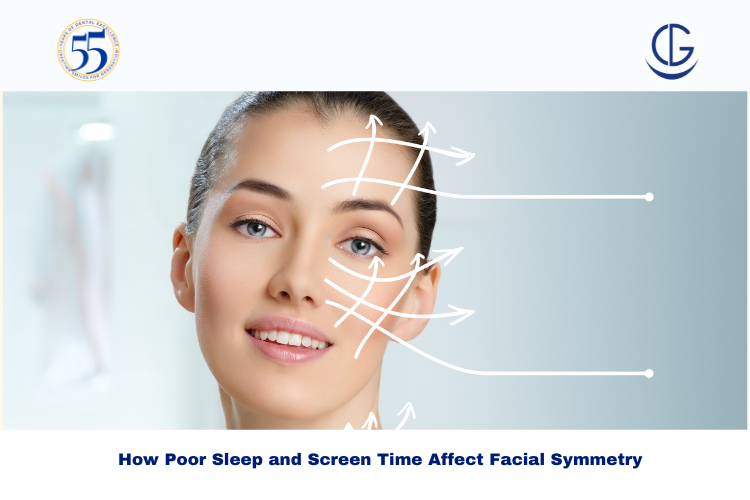Schedule Appointment


At Dr Gowds Dental Hospital in Hyderabad, we meet many patients who notice changes in their facial structure without understanding why. One of the most overlooked reasons behind these changes is a combination of poor sleep and prolonged screen exposure. Both habits slowly influence facial muscles, posture, and jaw function, which can ultimately affect facial symmetry.
If you have recently noticed unevenness in your face, jaw tightness, or discomfort while chewing, it may be related to your digital lifestyle. You can book a consultation at our Hyderabad clinic to receive a detailed examination and personalized treatment plan.
Poor sleep affects the body in more ways than just tiredness. It can also influence the way your face looks and functions. Many patients visit us with concerns about puffiness, uneven facial muscle activity, or jaw tension that appears more noticeable after nights of disturbed sleep.
Here’s how sleep impacts facial symmetry:
Lack of proper rest prevents facial muscles from recovering. Over time, certain muscles tighten while others weaken, creating uneven tension across the face.
Consistently sleeping on one side places pressure on the cheek muscles, jaw, and soft tissues. This long-term compression can affect facial contours.
Conditions such as sleep apnea or nighttime clenching overstimulate the jaw joint. When one side is more involved, imbalance develops gradually.
These sleep-related issues contribute to facial symmetry changes, especially when combined with digital habits.
Prolonged digital screen exposure has become one of the leading contributors to posture-related facial imbalance. Patients from Jubilee Hills and Gachibowli who work long hours on laptops or phones often report symptoms related to jaw strain and uneven muscle activity.
Below are the primary ways screen time affects facial symmetry:
Long hours spent looking down at phones create “tech neck,” a posture where the head leans forward. This posture puts pressure on the jaw joint, causing uneven movement and muscle imbalance.
Screen habits often make one side of the face work harder. For example, supporting the head with one hand or chewing mainly on one side while using a device can disrupt balance.
While not directly altering bone structure, blue light exposure contributes to inflammation, fatigue, and dullness, making asymmetry more noticeable.
Hours spent focusing on screens cause the jaw to tense unconsciously. Over months, this habit affects the balance of the masseter and temporalis muscles, which influence facial appearance.
These patterns collectively contribute to subtle but progressive changes in facial symmetry over time.
Many patients who work in tech hubs like Gachibowli or Kondapur experience a combination of poor sleep and prolonged screen use. Together, these habits create a cycle:
This interaction explains why many people see changes in their face even without major medical issues.
You may notice:
If you recognize these patterns, they may be early indications that your lifestyle is influencing your facial symmetry.
Our assessment includes:
This helps us pinpoint whether sleep issues, screen habits, or both are contributing to facial imbalance.
At Dr Gowds Dental Hospital, we offer targeted solutions based on your specific condition:
Reduces muscle overuse caused by stress and screen time.
Helps prevent nighttime muscle strain that leads to imbalance.
Addresses clicking, stiffness, and uneven jaw movement.
Ideal for patients with device-related jaw misalignment.
Improves nighttime recovery for facial and jaw muscles.
Restores balance between both sides of the face.
For patients with misalignment affecting facial symmetry.
Each plan is customized to restore comfort and balance.
You can reduce future imbalance by:
Consistent habits create long-term improvements.
Poor sleep and excessive screen time gradually influence jaw alignment, muscle balance, and posture, all of which play a major role in maintaining facial symmetry. These changes are subtle at first but may become noticeable over months or years.
If you are concerned about changes in your facial balance, jaw comfort, or posture, the safest approach is to get a professional evaluation.
Dr Gowds Dental Hospital in Hyderabad offers comprehensive assessments and personalized treatment to help restore natural facial balance and prevent future complications.
Yes. Prolonged screen use affects posture, jaw muscles, and TMJ function, all of which can influence facial balance.
Yes. Sleep deprivation affects muscle recovery and may increase swelling or uneven tension, leading to visible imbalance.
Forward head posture and uneven sitting positions strain the jaw joint, affecting alignment and facial appearance.
Yes. Nighttime clenching overdevelops certain jaw muscles, creating gradual imbalance.
Yes. We offer TMJ treatment, jaw alignment evaluation, muscle therapy, posture correction guidance, and personalized care based on your daily habits.